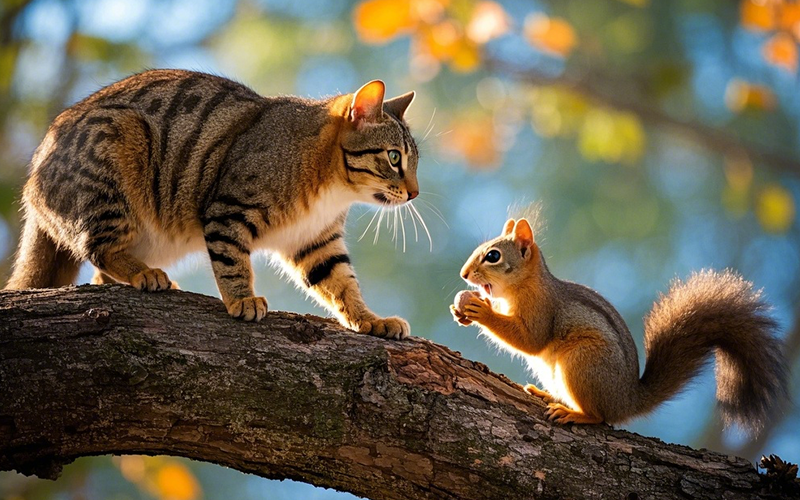Can Cats Eat Squirrels? A Guide to Feline Hunting and Safety
- 31 Mar 2025 11:15
The question, "Can cats eat squirrels?" might seem straightforward, especially considering that cats are natural hunters. In the wild, many cats (especially feral or outdoor cats) hunt small prey like squirrels, birds, and rodents. However, before letting your cat indulge in hunting their own meal, it's important to understand the potential risks and considerations.

Can Cats Eat Squirrels? The Short Answer
Yes, cats can eat squirrels, but there are several important things to consider before allowing them to do so. While hunting and eating small prey is natural behavior for many cats, there are health risks and practical concerns that come with it.
What You Need to Know About Cats Eating Squirrels
Nutritional Value: Squirrels are high in protein and fat, which are essential nutrients for cats. This makes squirrels an attractive natural prey item. In the wild, eating small animals like squirrels would provide cats with a balanced meal, including protein, fat, and some essential vitamins and minerals.
Potential Risks of Eating Squirrels:
Parasites and Disease: Wild squirrels can carry parasites, such as fleas, ticks, and worms, as well as diseases like leptospirosis, rabies, and toxoplasmosis. If a cat eats an infected squirrel, they may contract these diseases or parasites. It’s important to note that not all squirrels carry these diseases, but the risk is present.
Bones and Choking: Squirrel bones are small and can splinter easily. If a cat consumes the bones, they may risk choking or injuring their digestive tract.
Pesticides and Toxins: Squirrels living in urban areas or near agricultural lands might ingest pesticides or other toxins, which can be passed on to the cat if they eat the squirrel. This can lead to poisoning and other health issues.
Behavioral Considerations: Cats are natural hunters, so they may hunt and eat squirrels as part of their instinctive behavior. However, this doesn't mean it's always safe for them to do so, especially if they are house cats or haven't developed immunity to some of the diseases wild squirrels might carry. It's best to supervise outdoor cats and prevent them from eating wild animals if you're concerned about health risks.
What Happens if Your Cat Eats a Squirrel?
If your cat manages to catch and eat a squirrel, here’s what to watch out for:
Digestive Issues: Eating a squirrel, especially if it's consumed in large portions, could lead to digestive upset. Your cat might experience vomiting, diarrhea, or discomfort due to the richness of the animal's meat or bones.
Parasites: If your cat ingests parasites from a squirrel, symptoms like lethargy, weight loss, diarrhea, or bloating could appear. If you notice any of these symptoms, it’s important to consult a pet health professional.
Signs of Toxicity: If your cat eats a squirrel that has been poisoned or contaminated with toxins, they may display symptoms such as excessive drooling, vomiting, tremors, or seizures. In such cases, immediate medical attention is crucial.
What to Do If Your Cat Eats a Squirrel
Monitor Your Cat: If your cat has eaten a squirrel, observe them closely for any signs of illness or discomfort. If they’re acting normally, they may be fine, but it’s always best to err on the side of caution.
Contact a Pet Health Professional: If you notice any signs of illness (vomiting, diarrhea, lethargy, or unusual behavior), contact a pet health professional immediately. For quick assistance, PettureX is a great tool to get real-time advice or consultation about your cat’s health.
Parasite Prevention: Make sure your cat is up to date on flea, tick, and worm prevention. Regular vet check-ups and parasite treatments are important to ensure your cat stays healthy, especially if they are outdoor or hunting cats.
Safer Alternatives for Cats
Instead of letting your cat hunt squirrels or other wildlife, consider these safer alternatives to meet your cat’s nutritional needs:
High-Quality Cat Food: A well-balanced, protein-rich cat food will provide all the nutrients your cat needs, without the risks associated with eating wild animals.
Raw or Cooked Meat: If you want to mimic the experience of hunting, you can offer your cat small pieces of raw or cooked meat, like chicken or turkey, as a treat. Just make sure it's free of bones and seasoning.
Interactive Toys: To satisfy your cat’s natural hunting instincts, consider investing in interactive toys that encourage play and simulate the thrill of the hunt, like feather wands or laser pointers.
Conclusion
In conclusion, cats can technically eat squirrels, but it’s not without risks. While squirrels provide a natural source of protein and fat, they also come with potential hazards such as parasites, diseases, and choking risks. If your cat has consumed a squirrel or any wild prey, it’s important to monitor their health closely and seek professional help if needed. If you’re concerned about your cat’s hunting habits or diet, PettureX can provide you with expert advice and immediate consultations to help ensure your cat stays healthy and safe. 🐾
Related

Frankly Dangerous: Can Cats Eat Hot Dogs? Vet Explains the Serious Risks
- 16 Apr 2025
A Purrfect Protein? Can Cats Eat Ground Turkey Safely? (Vet-Reviewed Guide)
- 16 Apr 2025
Gritty Situation: Can Cats Eat Grits Safely? Vet Explains the Risks
- 16 Apr 2025
Gravy Danger Zone: Can Cats Eat Gravy Safely? (Vet-Reviewed Warning)
- 16 Apr 2025
Crunchy Query: Can Cats Eat Green Peppers? A Vet-Reviewed Safety Analysis
- 16 Apr 2025
Toxic Temptation: Can Cats Eat Grapefruit? Vet Explains the Dangers
- 16 Apr 2025
Emergency Meal or Major Mistake? Can Cats Eat Dog Food For A Couple Days? (Vet Guide)
- 16 Apr 2025
Dandelions & Felines: Can Cats Eat These Common Weeds Safely? Vet Explains
- 16 Apr 2025
Flaky Danger: Can Cats Eat Croissants Safely? Vet Explains the Buttery Risks
- 16 Apr 2025
Hazard Alert: Can Cats Eat Corn Husks? Vet Explains Dangers of This Fibrous Material
- 16 Apr 2025
